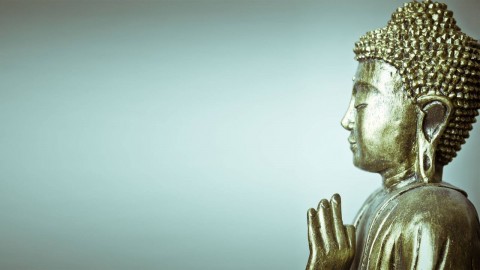“In the realm of fundamental activity there is no self; there is no world.”
Self and world arise from this foundation and return to this foundation. If we are clear in the arising and disappearing of self, then we can find our way home in any situation. When we willingly dissolve ourselves into relating, then the subsequent arising of self can be free from desire and attachment. Peace and completeness are not distant promises, but the natural condition from which we arise and to which we return.
The personal self that we identify with is an ephemeral appearance in the activity of life. Clinging to an “I am” self perpetuates the belief in a separate, objective world around us. It can create distance in our intimate relationships and diminish the vitality of experience. When we believe we are separate from our experience, alone in our relationships, then dropping our attachments is a long and difficult process. As we continue to learn that our foundation is a relationship, that from the beginning self and separation are an illusion, we can step free in a heartbeat. Then the primacy of a relationship is – relating and the vividness of experience is experiencing. Many teachings emphasize that dissolving our illusion of an “I am” self is the essential practice of Buddhism. We will return to this insight again and again and again.
Drop The Mind
Just imagine for a single moment that all thoughts have ceased… Then who are you? If all thoughts cease for a single moment, then who are you? No answer will be coming. You cannot say, “I am a Catholic,” “I am a Protestant,” “I am a Hindu,” “I am a Jaina,” “I am a Mohammedan” – you cannot say that. All thoughts have ceased. So the Koran has disappeared, the Bible, the Gita; all words have ceased! You cannot even utter your name. All languages have disappeared so you cannot say to which country you belong, to which race. When thoughts cease, who are you? – An utter emptiness, nothingness, no-thingness.
When thoughts cease, who are you? An utter emptiness, nothingness, no-thingness. It is because of this that Buddha has used a strange word. Nobody has ever done such a concept before, or since. The mystics have always used the word “self” for the interior-most core of your being. Buddha uses the word “no-self.” And I perfectly agree with him. He is far more accurate, closer to truth. To use the word “self” – even if you use it with a capital “S,” does not make much difference. It continues to give you the sense of the ego. And with a capital “S,” it may give you an even bigger ego.
Buddha does not use the words atma, atta – “self”. He uses just the opposite words: “no-self” – anatman, anatta. He says that when the mind ceases, there is no self left. You have become universal, you have overflowed the boundaries of the ego. You are pure space, uncontaminated by anything. You are just a mirror reflecting nothing.
We are what we think. All that we are arises with our thoughts. With our thoughts we make the world. If you really want to know who, in reality, you are, you will have to learn how to cease as a mind, how to stop thinking. That’s what meditation is all about. Meditation means going out of the mind, dropping the mind and moving in the space called no-mind. And in no-mind you will know the ultimate truth: dhamma.
And moving from mind to no-mind is the step, pada. And this is the whole secret of The Dhammapada.
Speak or act with an impure mind and trouble will follow you as the wheel follows the ox that draws the cart.
Whenever Buddha uses the words impure mind you can misunderstand it. By ‘impure mind’ he means mind, because all minds are impure. Mind as such is impure, and the no-mind is pure. Purity means no-mind; impurity means mind.
Speak or act with an impure mind – speak or act with mind – and trouble will follow you… Misery is a by-product, the shadow of the mind, the shadow of the illusory mind. Misery is a nightmare. You suffer only because you are asleep. And there is no way of escaping it while you are asleep. Unless you become awakened the nightmare will persist. It may change forms, it can have millions of forms, but it will persist.
Misery is the shadow of the mind: mind means sleep, mind means unconsciousness, mind means unawareness. Mind means not knowing who you are and still pretending that you know. Mind means not knowing where you are going and still pretending that you know the goal, that you know what life is meant for – not knowing anything about life and still believing that you know.
This mind will bring misery as certainly …as the wheel follows the ox that draws the cart.
Learning from the story Essential Practice: Drop The Mind
Experience Learning
We are what we think. All that we are arises with our thoughts. With our thoughts we make the world.
Speak or act with a pure mind and happiness will follow you as your shadow, unshakable.
Again, remember: when Buddha says “pure mind” he means no-mind. It is very difficult to translate a man like Buddha. It is an almost impossible job, because a man like Buddha uses language in his own way; he creates his own language. He cannot use ordinary language with ordinary meanings, because he has something extraordinary to convey.
Ordinary words are absolutely meaningless in reference to the experience of a buddha. But you should understand the problem. The problem is, he cannot use an absolutely new language; if he uses an absolutely new language, nobody will understand. It will look like gibberish.
That’s how the word gibberish came into existence. It comes from a Sufi; his name was Jabbar. He invented a new language. Nobody was able to make; head or tail of it. How can you understand an absolutely new language? He looked like a madman, uttering nonsense, utter nonsense. That’s how it happens! If you listen to a Chinese and you don’t understand Chinese, it is utter nonsense.
Somebody was asking a man who had gone to China, “How do they find such strange names for people? – Ching, Chung, Chang…”
The man said, “They have a way: they collect all the spoons in the house and they throw them upward, and when those spoons fall down… Ching! Chung! Chang! or whatsoever sound they make, that’s how they name a child.”
But the same is the case… If a Chinese hears English he thinks, “What nonsense!”
If that is the case with languages which millions of people use, what will be the case with a buddha if he invents an original language? Only he will understand it and nobody else. Jabbar did that – must have been a very courageous man. People thought that he was mad.
The English word gibberish comes from Jabbar. Nobody knows what he was saying. Nobody has even tried to collect it – how to collect it? There was no alphabet. And what he was saying was making no sense at all, so we don’t know what treasures we have missed.
The problem for Buddha is that either he has to use your language as you use it – then he cannot convey his experience at all – or he has to invent a new language nobody will understand. So all great masters have to be very much in the middle. They will use your language, but they will give your words their color, their flavor. The bottles will be yours, the wine will be theirs. And thinking that because the bottles are yours the wine is also yours, you will carry them for centuries. And there is a possibility that, thinking that it is your wine because the bottle is yours, sometimes you may drink out of it, you may become drunk.
Tags: Beauty Of Love Depend On Awareness Drop The Mind Life And Death Love Dispels Hate Pure Mind










